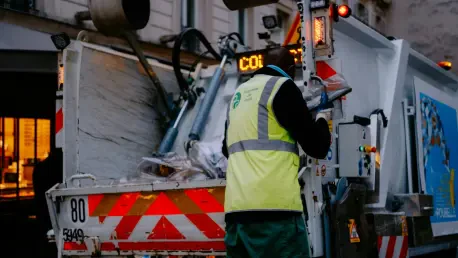Imagine a workforce that keeps communities clean and sustainable, yet faces daily risks of injury from hazards like sharp objects, treacherous surfaces, and extreme weather conditions, often without adequate protection or recognition for their critical role. In the waste and recycling industry, workers encounter significant occupational challenges that can lead to severe injuries or illnesses if not addressed. A powerful collaboration has emerged to tackle these dangers head-on, bringing together the U.S. Department of Labor’s Occupational Safety and Health Administration (OSHA), the Solid Waste Association of North America (SWANA), and the National Waste & Recycling Association (NWRA). Through a renewed three-year agreement, these organizations are pooling their expertise and resources to enhance workplace safety. This alliance aims to reduce incidents by focusing on critical issues such as needlestick injuries, slips, trips, falls, and environmental stressors like heat and cold, ensuring that the essential role of these workers is supported by a robust safety framework.
Strengthening Safety Through Collaboration
The cornerstone of this partnership lies in its commitment to sharing resources, training materials, and best practices to cultivate a stronger safety culture across the waste and recycling sectors. A key focus is on outreach and support for small- and medium-sized employers, who often struggle with limited resources to implement comprehensive safety programs. By leveraging data on workplace injuries and hazard exposure, the alliance is developing targeted awareness campaigns and training initiatives tailored to the specific risks faced by these workers. Furthermore, the agreement encourages cross-participation in events hosted by each organization, amplifying the reach of safety messaging throughout the industry. This collaborative approach not only fosters a unified front against occupational hazards but also ensures that practical solutions are accessible to businesses of all sizes, reinforcing the importance of protecting every worker who contributes to community cleanliness and environmental sustainability.
Driving Prevention with Data and Education
Looking back, the renewed alliance between OSHA, SWANA, and NWRA marked a pivotal moment in prioritizing prevention and education to mitigate workplace risks in the waste and recycling industries. Industry leaders emphasized the value of collective effort, with statements from figures like SWANA CEO Amy Lestition Burke and NWRA President and CEO Michael E. Hoffman underscoring a shared dedication to ensuring workers return home safely each day. The partnership’s data-driven strategies tackled the most pressing safety concerns systematically, while its inclusive engagement with smaller employers addressed diverse needs within the sector. Moving forward, the focus should remain on sustaining this momentum by expanding training programs and refining tools that address evolving hazards. Stakeholders are encouraged to build on this foundation over the coming years, from now through 2028, by fostering continuous dialogue and innovation in safety practices to safeguard this vital workforce for the long term.









